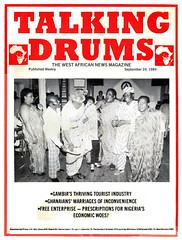Music And Arts Scene
African Records Review
By Kwabena Asamoah
BOPOL MANSIAMINA: 'Samedi Soir' (SYLLART 8305) 'Samedi Soir' 'Madela'/'Afric Ambience' 'Muana Samba'
Bopol, who together with Syran, Wuta May and Nyboma, constitute les 4 Etoiles, pounces on the listener with this interesting album just as the others do from time to time. It must be a con- venient arrangement for the four to agree to go solo and as a group at the appropriate time. The consensus must be strong indeed.A respected bassist within the Zairean circles in Paris, Bopol maintains his name with this album especially with 'Samedi Soir' and 'Afric Ambience'.
The lyrics in 'Afric Ambience' may sound simple-naming countries such as Gabon, Ivory Coast and Togo - but the rhythm and the melody will certainly appeal to determined dancers. Attey is fluent on his sax and Syran shows his prowess on the lead guitar.
Like the other modern Zairean musicians including Kanda Bongo Man, Bopol throws in synthesizer in the opening stanza of 'Muana Samba' which is a rhumba (unlike the other tracks) sweetened by the harmonious voices of Jean Papy, Tchico, Ballon and Babo Zuzeka. The guitar works present a facet of Zairean music by now familiar to most listeners. The short sharp sax riffs spell a space for Syran to lilt beautiful solos in the air. Beneath the music there is the rhythm guitar of the versatile Pablo Lubadika Luve.
The guitar solo that introduces 'Madela' as a rhumba is ear-catching and completely overwhelming even before the song turns soukous. But if you are really looking for a Saturday dance song 'Samedi Soir' as the name implies is the one for you. As the stand-out track, the synthesizer whistles at the same time as the guitars and the beautiful voices. Sung in
French, England and lingala, 'Samedi Soir' is about the fun of Saturday night drinking, eating, dancing and who knows what else. The theme is not restricted to Zaire. The hypnotic rhythm follows the listener wherever he is.
KING SUNNY ADE & HIS AFRICAN BEATS: 'Explosion' (ALPS 40) 'Kirakira' 'Oro Agba' 'Iya Mi' 'Iwa Ni Ka Tun Se' 'Maa Gbure'/'Owo Genge' 'Aga To Nle Koko' 'Anjuwon O See Wi' 'Nwon Nbinu' 'Lara Won Lo Wa'.
King Sunny Ade has once again hit the music scene with this album which apparently reunites him with his Nigerian audience after months of European and American tours. In Nigeria, this album has come to quench the thirst for the music of African Beats and it is likely to spread into other parts of the world.When the guitars begin to sharpen individually you are reminded that juju music is on its way. The cluster of the instruments is the most difficult aspect of juju music for the uninitiated but it takes him a short time to get used to. The beginner - 'Kirakira' - is one of the most beautiful songs to be penned by King Sunny Ade whose lead vocals here would entice the newest novice.
The vocal harmony inspired by the polyrhythm of the instruments surrounds King Sunny Ade's voice to polish the medley of songs on the album. The rhythm guitars are usually tronger in juju music but here King Sunny Ade's lead guitar filters through while the Afro-funk drum beats and colour to the music. The automatic handclaps fill the background with effects that do not necessarily distract your attention. At the basis of it all is the bass guitar which finishes off the A-side.
If you are in for talking drums and understand, let the 5-track B-side spin for you without delay. The rhythm is pure insistence and the talking drum operates the usual call and answer scheme. The steel guitar solos from time to time to warn you that juju music is still on. The chorus at the end of the track makes it sound as if a whole population is singing, but the effect on the music is tremendous, King Sunny Ade waits till the end before he registers a guitar solo that will bewilder the listener and yet entertain him.
